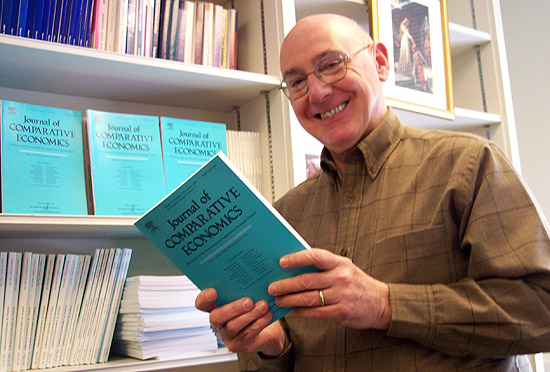Banking on Emerging Financial Institutions
 |
|
| Economics Professor John Bonin is the editor of “Journal of Comparative Economics.” | |
| Posted 03/15/05 | |
| As John Bonin recalls a recent overseas trip, one scene in particular stands out.
“The tree-lined streets with boutiques sprinkled among retail giants like the Gap could have easily been in a European city,” says Bonin, the Chester D. Hubbard Professor of Economics and Social Science and editor of the “Journal of Comparative Economics.”
Perhaps the most remarkable part of this recollection is that the streets he describes weren’t in Europe or even the west. They were in Shanghai, China. The image is important because it illustrates how quickly China is growing economically. And yet, when Bonin traveled to the nearby city of Wuxi, he encountered another image along the way that impressed him just as much. “There were huts sitting in mud with peasants attempting to eke out an existence from farming or fishing in small ponds,” he says. “It was as if these people were from another time entirely.” Much like the two extremes of China, Bonin studies extremes within the world of banking. His research focuses on financial sector reform and bank privatization — the successful transition of financial institutions away from the controlling hands of the government towards private control. His travels and research have landed him in many far away countries, including China, Hungary, Czech Republic, Bulgaria, Poland and Russia. Bonin’s love for far away countries developed during grade school after he wrote a paper about China’s Yangtze River. Ever since, it’s been this country that has captured Bonin’s attention the most. “I’ve always had this romantic notion of China,” he says. “I guess you could say I came full circle.” Bonin’s most recent visit to Shanghai last May stemmed from an invitation to speak at a conference on the governance reform of state-owned enterprises in China. “When I lectured at Peking University in Beijing in 2001 to a room full of about 50 Chinese students, it was incredibly rewarding,” he says. “They were the most inquisitive, captivated audience I’ve ever had.” Bonin is also asked several times a year to travel to Washington, D.C. to meet with World Bank leaders who are eager to collaborate with economists and research groups. Some of his research has even been circulated as policy briefs in Washington for government officials and members of Congress. In addition, he compiled a case study of a privatized Polish bank for a U.S. Treasury Department funded project about banking in Central Europe and Russia. It can take years for emerging-market countries to develop efficient financial institutions, he explains.”My job is to supply them with background information based on the experiences of other countries,” he says. For example, while in Beijing, Bonin met with an official from the banking supervision department of the People’s Bank of China. This person eventually became very interested in Hungary’s experiences with bank privatization. One of Bonin’s newest project includes collaboration with assistant professor of economics Masami Imai. They are researching how stock prices of companies in Korea, including Daewoo and Hyundai, are affected by news of changes in their main bank’s ownership. The study will shed light on the impact that foreign owners of domestic banks have on domestic lending, especially lending to long-standing large corporate clients. Bonin enjoys the research, but enjoys his work with students even more. He recalls one former student, David Lipton, ’75 who went on to become the Undersecretary of the U.S. Treasury Department in the 1990’s. “I was sitting across from Lipton one night over dinner and he looked at me and said ‘You’re the reason I’m an economist,'” Bonin says. “To hear that was one of the most rewarding experiences of my teaching career.” Bonin will also travel to Paris in April to teach a master’s class on financial economics in transition countries at the Sorbonne. “First hand experience compliments standard research sources,” Bonin says. “Experiencing other places and cultures allows me to bring the real world into the classroom and enliven the learning process.” |
|
|

